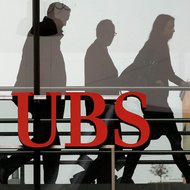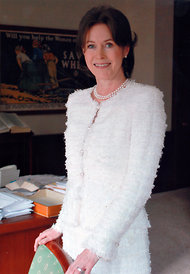 Arnd Wiegmann/ReutersAbove, a branch of UBS in Zurich. Three former bank executives were found guilty last week of rigging bids to invest municipal bond proceeds.
Arnd Wiegmann/ReutersAbove, a branch of UBS in Zurich. Three former bank executives were found guilty last week of rigging bids to invest municipal bond proceeds.
The conviction on Friday of three former UBS executives on conspiracy and wire fraud charges for rigging bids in the municipal bond market may serve as a template for how prosecutors can pursue cases in the manipulation of the London interbank offered rate, or Libor.
In the UBS case, federal prosecutors were able to obtain the convictions involving an arcane area of the financial markets. The accusations involve various bankers colluding in setting interest rates at the expense of investors and borrowers.
That certainly has parallels to the Libor inquiry as more banks are investigated in the submission of false information for the benchmark rate used in trillions of dollars of loans and bonds worldwide.
White Collar Watch
View all posts
In the UBS case, three of the bank’s former executives were accused of working with brokers at other firms to rig bids submitted to local governments and agencies to invest the proceeds of their bond offerings. By lowering the interest rate paid on the investment contracts, the firms were able to generate higher returns.
The defendants were also charged with accepting kickbacks from firms in exchange for steering business their way. The government relied on recordings and e-mails to establish its case, along with cooperating witnesses who had entered guilty pleas.
 In the recent UBS case, United States Judge Kimba M. Wood took a broad view of wire fraud violations that affect financial institutions.
In the recent UBS case, United States Judge Kimba M. Wood took a broad view of wire fraud violations that affect financial institutions.
Although this type of collusion can violate the antitrust laws, federal prosecutors centered their case on the wire fraud statute because it provides a longer prison term and has a longer statute of limitations to pursue charges. A defendant convicted of an antitrust violation can receive a sentence of up to 10 years, while wire fraud that affects a financial institution authorizes a maximum 30-year prison term.
The defendants raised the statute of limitations issue in trying to get their case dismissed; the transactions occurred primarily from 2001 to 2004, and the defendants were not charged until late 2010.
Under federal law, most charges must be filed within five years of the conduct. The UBS defendants asked the United States District Court in Manhattan to dismiss some counts on those grounds. A law adopted in 1990 during the savings and loan crisis, however, expanded the statute of limitations to 10 years for banking crimes and any violation of the wire fraud statute that affects a financial institution.
An opinion by Judge Kimba M. Wood, who presided over the case, took a broad view of what affects a financial institution. As a result, she concluded that the longer limitations period applied to the UBS case.
Although the victims were state and local governments — which do not qualify as financial institutions — she found that settlements affected UBS and other banks because they paid fines and civil penalties to resolve their cases. Although it was the defendants’ own conduct that impacted the financial institutions, their violations were enough to extend the limitations period to 10 years.
The case against the three former UBS executives has a number of interesting parallels to the Libor investigation, providing the framework for prosecutions that might emerge.
One of the defendants, Peter Ghavami, a Belgian who had been head of an investment bank in Moscow, was arrested in December 2010 at Kennedy Airport. In the Libor case, a number of banks are outside the United States, so individuals who might be involved should be wary about traveling to this country because of the risk that they could be detained.
The $450 million settlement by Barclays in the Libor investigation means that a financial institution was affected by the submission of false interest rates for setting Libor. The Justice Department and the Commodity Futures Trading Commission are investigating other banks for their role in manipulating Libor, so we can expect additional settlements that are likely to include substantial monetary penalties.
That means federal prosecutors can rely on the 10-year limitations period because manipulation of Libor affected a financial institution, opening a much wider window for charging individuals for violations.
The Barclays settlement details a number of communications in 2005 and 2006 by traders at the bank seeking to have its Libor submissions manipulated to benefit their investment positions. Among the statements was one in which a person responsible for submitting information for Libor told a trader “Always happy to help, leave it with me, Sir,” and another saying “Done . . . for you big boy.”
The settlement outlining the violations notes that the Barclays traders also colluded with counterparts at other banks to manipulate the Libor submissions, and that they “made the requests in person, via e-mail, and through electronic ‘chats’.” As in the UBS case, prosecutors can pursue charges for violating the wire fraud statute at the banks because e-mail and instant messaging almost always involve interstate transmissions via the Internet.
The definition of an interstate wire transmission has also been broadly construed by the federal courts, making wire fraud particularly useful in cases involving manipulation of information. The communication does not have to be important to the execution of the fraud so long as it was a step in the process, which can include a confirmation like telling “big boy” that the false information had been submitted. A defendant need not even be the one sending or receiving the interstate wire for a violation, or have any knowledge that the communication crossed state lines.
The federal sentencing guidelines recommend substantial penalties for fraud convictions based on the amount of the loss suffered by victims. Because Libor is so important to the loan and debt markets, the potential impact of even a small variation in the rate could trigger enormous losses. Federal judges do not have to make precise calculations when assessing the loss, or even a potential loss. A recommended sentence for manipulating Libor could easily reach 20 years or more.
The conviction of the former UBS executives shows that prosecutors can win a case involving complex transactions and sophisticated financial issues under the wire fraud statute. That is likely to encourage the Justice Department to pursue cases from the manipulation of Libor against individuals for conduct that took place in the last 10 years.
US v Ghavami Statute of Limitations Opinion July 2012
Peter J. Henning, who writes White Collar Watch for DealBook, is a professor at Wayne State University Law School.
Article source: http://dealbook.nytimes.com/2012/09/04/in-ubs-convictions-parallels-to-the-libor-investigation/?partner=rss&emc=rss

Speak Your Mind
You must be logged in to post a comment.